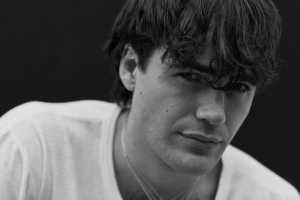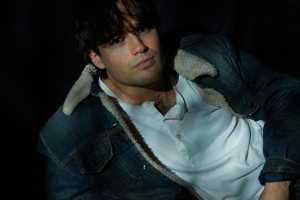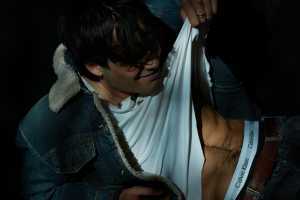What does success mean to you? “Oh, fuck off,” says Jamie Flatters, laughing at the question. “The success thing? I don’t know, man. In the creative field, especially these days, it would be to never have to do anything that’s hard ever again. But you wouldn’t really want that.”
He sips his pint and ponders further. “Give a movie to anybody and they instantly take it. Or do a tour around America as sandy crow. That’s kind of it.”
In 2015, a teenage Flatters reached the national final of a public speaking competition with a speech exploring the definition of success. I found the video on YouTube and thought it would be a fun way to open the interview. “Oh sorry, man, I should have been right there with you!” says Flatters when he realises I’m referencing a decade-old speech he made in school. “What did he say in 2015?”
That you can’t define success by money. The 24-year-old Flatters grins at his youthful idealism. “That’s a man who’s never achieved anything in his life at 15! Success? It’s undefinable.”
Also exams shouldn’t matter... “Says the guy who’s getting shit exam results!”
I thought it was a fine speech. “You’re very kind,” says Flatters. “All I remember from that speech is the very well-rehearsed Barack Obama joke,” says Flatters. “Where I go, ‘I couldn’t be the first black American president. I’m not American.’”
The line got a huge laugh. It wasn’t enough to win the competition but the speech has aged well. (Unlike his exam results.) Flatters has built a multifaceted career that fuels his creative juices, takes him around the world, and allows a Friday afternoon pint to technically count as a work engagement. Sounds a winner to me.

The Flatters creative mentality is essentially everything everywhere all at once. He’s primarily known as an actor, one whose CV already includes a sizeable role in the third highest-grossing film of all time, Avatar: The Way of Water. (Such an achievement would typically trigger global recognition except he played a blue CGI teenage alien and there’s minimal resemblance between actor and character, which is probably a good thing.)
He recently directed his debut feature film Shoulders, a surrealist monochrome fable that premiered at Clapham Film Festival, just down the road from his house. He releases music and plays gigs under the alias sandy crow – the music videos are all self-directed. He composes poetry and posts it on Instagram. Some of it, anyway. Most remains buried in his Notes app.
For Flatters, quantity breeds quality. “I have a lot of friends who have that one film idea in their head or that one idea of their debut album. Those ideas often then get delusional. They’ve lasted for so long that you are trying to meet an ideal, instead of meeting the actual reality of what you want to deliver… High output for me is about the destruction of ideology and ideals. The high output is just a no-bullshit filter.”
This is a very Flatters answer: a combination of philosophical musing and blunt speaking. He’s not afraid to grapple with the big concepts but never loses his wry sense of humour. He’ll say things like “art is a testament and proof of the willingness to suffer as long as the end goal is beauty,” and then crack a joke about Gen Z. He jokes a lot, often at his own expense.
“Say I was completely drunk. That’s my excuse,” he grins after he mistakenly refers to watching the film Prince of Arabia as a child. (He meant Lawrence.) “Seven pints in, you really forget what’s going on.” (We have a civilised two.)
He grew up in Clapham, and attended school at Lambeth Academy on Clapham Common. He’s the middle of three brothers. Mutual affection was expressed through physical competition, WWE wrestling games and the like. “Any excuse to beat each other up in a fictional format,” says Flatters. Isn’t the middle child supposed to seek out attention? “Apparently so, but I don’t believe in that.”
By his teenage years, he had an agent and was auditioning for nearly every musical in London – Matilda, Charlie and the Chocolate Factory and the like. He kept getting to the final round and missing out. His breakthrough came not on stage but on screen, playing the love interest in CBBC sitcom So Awkward. He was 13 when cast in the role. “Very young,” says Flatters. “Very uncool. I should have waited until the drugs phase and then started acting.”
He was only 16 when he landed the Avatar sequel, emerging from a global casting process with the role of Neteyam, the oldest child of the protagonists Jake Sully and Neytiri. For his audition he performed Anthony Michael Hall’s monologue from The Breakfast Club, describing a planned suicide with a flare gun. The London audition was followed by several Zoom calls and finally an X Factor-style bootcamp in Los Angeles with 30 other kids. “You do a week of freedive training, parkour, archery training, a lot of focus on accent work. And you’d see half the kids go after five days, as you do in reality TV shows.”
Ten kids remained at the end of the process. Nobody knew if they’d been successful, or even what role they were being considered for. “They were so secretive about the parts,” says Flatters. “You were never sure what was going on.”
On the final day of the camp, he approached James Cameron. “Thank you so much for having me,” the 16-year-old Flatters told the legendary director. “Don’t worry, man,” replied Cameron. “I don’t think this is over.”

Auditionees were given a date when they would be told the final decision. Late in the day, Flatters received a call from his agent. He didn’t answer and spent ten minutes convincing himself that he didn’t need the job. “Even at 16, about to turn 17 years old, you’re so used to rejection that you’ve got to kill your own dreams before someone else does.” When he finally called back, “I didn’t know what to do with myself because I had already got depressed!”
The shoot lasted two years, with another year of callbacks. The child actors stayed around the corner from the studio in a hotel on Rosecrans Avenue – a street frequently referenced by Kendrick Lamar on his album m.A.A.d city. “There is a song dedicated to Kendrick Lamar and his friends robbing a house there,” says Flatters, a massive rap fan.
How did he pass the time in LA when he wasn’t filming? “To speak truthfully? After I was there for six months, there would be a car that would deliver weed straight to the hotel without asking my age. And there was a Shake Shack two minutes walk away.”
He couldn’t drive and so explored the city on foot. Everyone drives in LA: cars would pull over to check he was OK. He was a long way from home. “The cultural difference is so large that you don’t even know where to look for solace.”
He describes filming as “the operatic version of an actor’s experience. It’s so grand what you’re given.” How was Cameron? “I fucking love the guy,” says Flatters, comparing the famous perfectionist to a demanding father. “I think me and him are completely aligned on artistic approach. You can’t have such a driven focal point and build such a massive world if you’re constantly going around and asking if everyone’s OK and if they had a nice morning.”
However, he disagreed with Cameron’s suggestion that he continue his education at drama school. “I just thought, ‘Oh, fuck that’,” says Flatters. “I don’t need to go to drama school. I’m in your film, mate.” Why did Cameron suggest it? “I dunno. He always supports the idea of education. Even he would say one thing that makes him good is the fact that he’s not always paying attention to film. He’s interested in so many different things.”

His time with Cameron proved invaluable when Flatters directed his own feature film last year. “He was a massive inspiration in terms of a director’s need to bring a vision,” says Flatters. “He told me, and a whole generation of people, that you can take on more responsibility than you can even imagine. That’s what pushed me to make Shoulders in the first place, and self-produce it.”
Shoulders depicts a group of soldiers gradually going mad in rural Scotland as they await the appearance of an unknown enemy. It was filmed over two weeks in the village of Invergarry (population 438) with a cast and crew of 14. (Swelling Invergarry’s population by 3.2%.) There was no electricity or running water. Everyone took turns to cook. “It was definitely a hard filming process,” says Flatters.
He sent Cameron the finished film and received a “full critique”. “He was very kind. He said he completely backed me as a director. He was very impressed with the visual world building, which I completely credit him for.” After rhapsodising on Cameron’s influence, Flatters adds, “He also said, ‘Stop making stoner films, man. You can do better than this.’” Shoulders will stream on Amazon Prime in April so you can light up and judge for yourself.
“Every decision he makes, he puts the creativity first,” says George Jaques of his friend and former writing partner. “He’s led purely by creativity, which makes him very true to himself.”
Jaques has known Flatters since they were both 16. They met through Jaques’ theatre company, Athenaeum Productions, and quickly recognised the other as a similarly creative spirit. “We both felt quite young in a very adult industry,” says Jaques. “We bonded over this love of storytelling and being creative. We didn’t have every door opened for us.”
They decided to write a film together. What would ultimately become Black Dog was hammered out over daily writing sessions at their respective houses or the local Caffè Nero. The process was complicated by Flatters frequently disappearing across the Atlantic. “I would be going off to Los Angeles to shoot Avatar at that point,” says Flatters. “Every time I was back, for probably a three week period at a time, George would be the one who would literally save me from smoking weed in my bedroom all day. He’d be like, ‘No, we’re meeting up at 8am and we’re going to write that script.’”
As well as Black Dog, the pair worked on multiple plays and in 2019 Flatters starred in Jaques’s short film, Silence. He went from one of the biggest blockbusters in history to an unpaid role in an indie short. “That sums up Jamie,” says Jaques. “Creatively he makes such bold choices. If you ever think he’s going to do one thing, he’ll do the other. He’s been a creative force ever since I met him.”
“Interesting,” says Flatters when I read these words to him. “The one qualm with the acting world is you can’t pick your destiny. And a lot of people’s success and judgement days of being given their rewards, it’s not necessarily by their choosing. Especially at the level I’m at.
I’m still not at the level I wish to be. It’s not at the level of choice. It’s the level of just being grateful for opportunity. I’m literally taking every opportunity that comes to the point where I can choose the aesthetic instead of being handed it.”
View on Instagram
The directing, the music, the poems all provide a level of control that acting does not. “A lot of actors aren’t very cool. Am I allowed to say that? Compared to musicians, actors don’t have enough control in their careers to be cool.” As an actor, “there’s just a lot of mental work in order to really appreciate actually how much of a small cog you are.”
Music has been a passion since adolescence but he only started releasing last year under the alias sandy crow. His Instagram is dominated by music videos, although he also uploads short films, poetry and a couple of Shoulders posts. (The last video showed Flatters railing against self-promotion while someone erased the word ‘Shoulders’ from a wall behind him. It was captioned: ‘We will not be promoting Shoulders. As true artists, we don’t care… I think.’)
As well as receiving film notes from James Cameron, Flatters was encouraged in his music by Paul Feig – who directed him in the 2022 film The School for Good and Evil. “He’s very sweet,” says Flatters. “He was very supportive of my music. By the time I was working with him, I was actively making demos at my hotel room. He knew about it and he gave me the time of day.”
Wonderland magazine described sandy crow as “a persona armed with vulnerability and authenticity that transcends music. Exploring themes of regret and reconciliation, with influences ranging from rap to guitar legends such as Elliot Smith and Joni Mitchell, sandy crow’s sound is a unique fusion of genres.”
Flatters will traverse many genres in the years ahead. “Acting is such an ingrained thing for me. It’s always going to be the default. Songwriting is more the hobby that is a beautiful mistake. If there’s any success in music, that will be the childhood dream coming true.”
A worthy dream from an extraordinary young creative. I wish him every success.
Stream Shoulders on Amazon Prime
